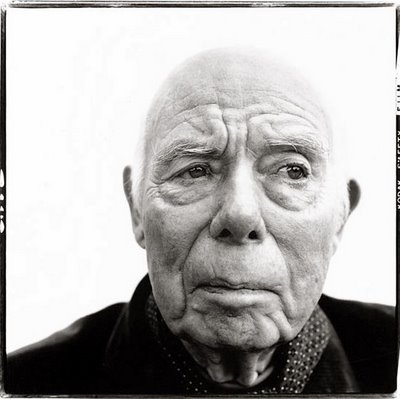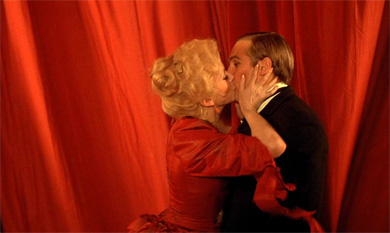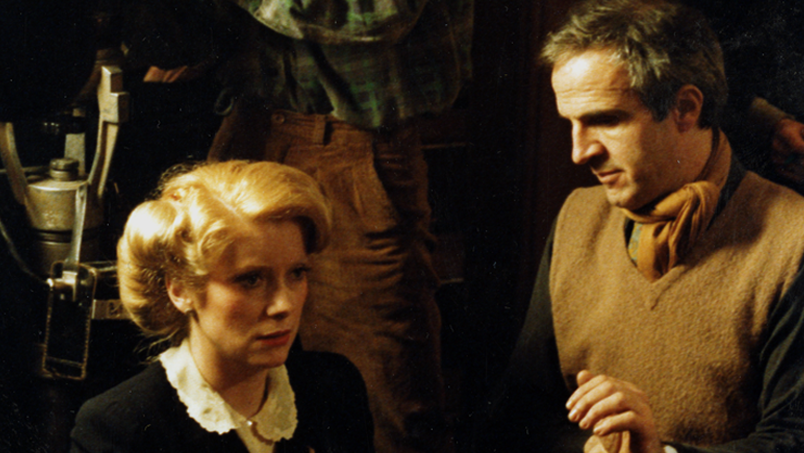Jean Renoir’s Carola vs. Francoise Truffaut’s The Last Metro
Written by Joe D on September 2nd, 2010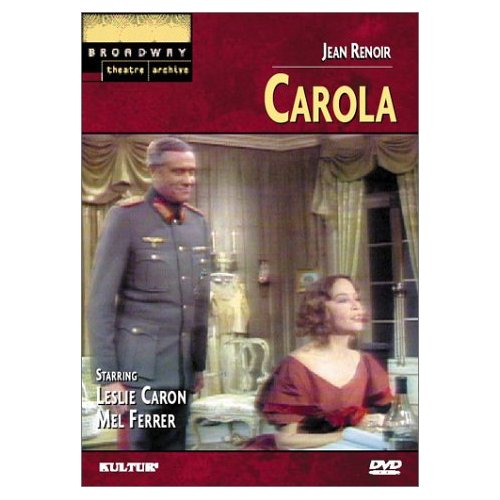
I tracked down a copy of Jean Renoir’s Carola, This is a play written by Renoir that he was going to direct but ill health forced him to bow out and his good friend Norman LLoyd filled in. It’s a made for TV production done for KCET’s Hollywood Television Theater back in 1972, it stars Leslie Caron, Mel Ferrer, Anthony Zerbe, and Michael Sacks. An interesting take on the Nazi occupation, redolent with Renoir’s humanism,some of the Nazi’s are human beings not just robotic killing machines and the worst people in the play are the French members of the Gestapo. The story is set in wartime Paris in an old theater during the performance of a play.
Francoise, you ripped me off!
Leslie Caron is the star of the play and almost all of the action takes place in her dressing room during the intermission between acts and after the play. Leslie is beautiful in the part of an actress on the other side of ingenue-hood, caught up in an offstage drama revolving about her many lovers, there’s Gen. Von Clodius (Mel Ferrer) her first true love from years ago now an occupying General seeking an audience with his ex-lover, Anthony Zerbe (a terrific actor and one time Citroen owner) the director/owner of the theater and Carola’s current bedmate, and Henri Marceau(Michael Sacks) a naive young Freedom Fighter, who risks his life for an autograph from his favorite actress, the woman he’s loved from afar, Carola. The spirit of this piece is closely related to Renoir’s masterpieces Grand Illusion and Rules Of The Game, Illusion for it’s gentleman officer (Erich Von Stroheim) and Rules for it’s frank sexuality. Carola has had many lovers since her first affair with Von Clodius and Zerbe even says to her “If you won’t speak to anyone you’ve slept with you’ll be all alone” or words to that effect. The life of an actress in Paris of that time was a promiscuous one. This play is really about love, different shades of it, and what love means to all involved, innocent, jaded, idealistic,etc. The center of this malestrom of passion is Carola, desired by everyone, each for his own reason, even desired by the Gestapo colonel who appears late in the play and praises Carola for her “proof of Aryan supremacy”. The occupation provides only a background to these passions and it creates a situation where normal people are put to the test, where their core values are under pressure and they can cave in or pay with their lives. The surprise is which ones do just that.
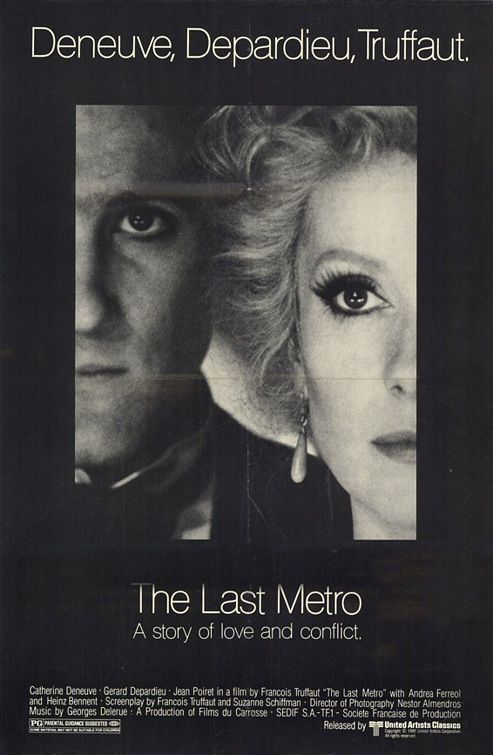
The Last Metro was released in 1980, 8 years after Carola. It too takes place in a theater during the occupation of Paris by the Nazi’s. There are some striking similarities, Catherine Deneuve is the star of the plays put on at the theater, she is desired by Nazi’s and idealistic Freedom fighters( Gerard Depardieu), the war is once again a kind of backdrop for the lives, passions, both real and petty, of the actors and personnel of the theater. Almost as if the war didn’t exist outside of the difficulties it created for the players, food, electricity, threat of being shut down by censors. Anthony Zerbe has a wonderful speech in Carola where he describes all life outside the theater as being less real to Carola than the parts she’s playing onstage, a real insight into both films. The main difference is the character of Steiner in Metro. He is Deneuve’s Jewish husband, director and owner of the theater. He is hiding in the basement of the theater, listening to the performances(and perhaps his wife’s infidelities) through an air vent.
Kiss me louder so my husband can hear!
For some reason I never bought into this character, something seemed false to me about him, I couldn’t quite put my finger on it. Only later when I read a biography of Truffaut did I get an understanding. Truffaut was a bastard, I mean he was born out of wedlock, his mother married soon after but the man she married was not his father. Years later when Truffaut was preparing a film he worked with a private detective on some research, then he asked the detective to find his real father. The man did so and Truffaut found out his real father was a Jewish dentist living in a nearby town. The sudden revelation of his own Jewish roots struck Truffaut like a thunderbolt. He was conflicted, he had an identity crisis and I think this is why the character of Steiner is so unsatisfying. Truffaut even hired a Jewish writer to work on Steiner’s part in the script, to assure him of it’s “Jewishness”. And to top it off the actor he hired to play Steiner (Heinz Bennent) wasn’t Jewish!
Catherine, do it more like Leslie Caron.
Truffaut took Carola opened it up in a more filmic manner (scenes outside the theater) transplanted his personal conflict about being Jewish into it and made a film. A very successful film, I might add, a real crowd pleaser, happy ending (unlike Carola) less realistic depiction of the sex lives of it’s protagonists, a bunch of cute eccentric characters. As a matter of fact several times in Carola one of the characters refers to the fact that due to delays, that night’s performance of the play will run longer, causing the audience members to be late, miss the last metro ( subway) and violate curfew. Truffaut even got his title from the text of Carola! The final scene of Metro reminds me of Zerbe’s speech where the play and reality are purposely confused, which is more real to the actor? A final note, Leslie Caron, a friend of Truffaut and Renoir was so incensed that Truffaut gave no credit or even mentioned Carola and Renoir in regard to Metro that she never spoke to him again.
Trailer for The Last Metro
Norman Lloyd speaks on Carola

